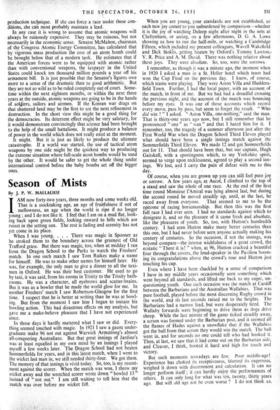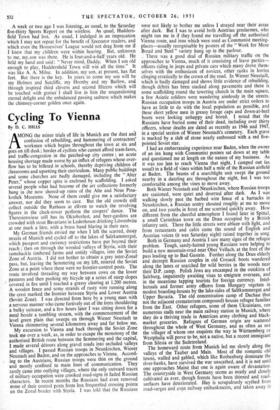Season of Mists By J. P. W. MALLALIEU I AM now
forty-two years, three months and some weeks old. That is a stocktaking age, an age of fruitfulness if not of mellowness, an age when the world is ripe if no longer young ; and I do not like it. I feel that I am on a mud flat, look- ing back upon green fields, looking onward to hills which are russet in the setting sun. The zest is fading and serenity has not yet come in its place.
When I was young. . . . There was magic in Spooner as he stroked them to the boundary across the greenest of Old Trafford grass. But there was magic, too, when at midday I ran from the Dragon School to the Parks to watch the Freshers' match. In one such match I saw Tom Raikes make a name for himself. He was to make other names for himself later. He was, for example, the only man to give a dinner to all the taxi- men in Oxford. He was their best customer. He used to go by taxi, it was said, from his rooms in Trinity to the Trinity bath- rooms. He was a character, all eyebrows and scatter-brains. But it was as a bowler that he made the world glow for me. In another Freshers' match 'I saw Robertson-Glasgow for the first time. I suspect that he is better at writing than he was at bowl- ing. But from the moment I saw him I began to imitate his bowling action. This had disastrous effects on my analysis, but gave me a make-believe pleasure that I have not experienced since.
In those days it hardly mattered what I saw or did. Every- thing seemed touched with magic. In 1921 I saw a gaunt under- graduate make 96 not out against Warwick Armstibng's almost all-conquering Australians. But that great innings of Jardine's was at least equalled in my own mind by an innings I played myself a few weeks later. The Dragon School had not beaten Summerfields for years, and in this latest match, when I went to the wicket last man in, we still needed thirty-four. We got them. The memory of that innings is vivid today. So, too, is my resent- ment against the scorer. When the match was won, I threw my wicket away and the wretched scorer wrote down " bowled 13 " instead of " not out." I am still waiting to tell him that the match was over before my wicket fell. When you are young, your standards are not established, so each new joy comes' to you unburdened by comparison—whether it is the joy of watching Duleep night after night in the nets at Cheltenham, or seeing, on a few afternoons, D. G. A. Lowe showing us how to run the half-mile, or watching a Cambt'idge Fifteen, which included my present colleagues, Wavell Wakefield and Dick Stok-es, getting beaten by Oxford's Tommy Lawton, V. R. Price and A. M. David. There was nothing relative about these joys. They were absolute. So, too, were the sorrows.
I remember, as though it was a minute ago, the moment when in 1920 I asked a man in a St. Helier hotel which team had won the Cup Final on the previous day. I knew, of course, which teams were playing. They were Aston Villa and Hudders- field Town. Further, 1 had the local paper, with an account of the match, in front of me. But we had had a dreadful crossing the previous night, and the account of the match was bouncing before my eyes. It was one of those accounts which record every move, pass by pass, but seem to forget the result. " Whb did win?" I asked. Aston Villa, one-nothing," said the man. That is thirty-one years ago now, but I still remember that he pronounced one ' as " wan " and that I hated him for it. I remember, too, the tragedy of a summer afternoon just after the First World War when the Dragon School Third Eleven played what should have been a single innings match against the Summerfields Third Eleven. We made 12 and got Summerfields out for 11. That should have been that, but our captain, Hugh Gaitskell, with a sportingness which, to my Yorkshire spirit, seemed to verge upon recklessness, agreed to play a second inn- ings. We lost, and I carry the pain of defeat with me to this day.
Of course, when you are grown up you can still feel pure joy or sorrow. A few years ago, at Ascot, I climbed to the top of a stand and saw the whole of one race. At the end of the first time round Monsieur l'Amiral was lying almost last, but during the second round he moved steadily up, until, at the last, he raced away from everyone. That seemed to me to be the epitome of racing horsemanship. But then this was the first full race I had ever seen. I had no standards against which to denigrate it, and so the pleasure of it came fresh and absolute, like the pleasures of youth. So, too, with Hutton's hundredth century. I had seen Hutton make many better centuries than this one, but I had never before seen anyone actually making his century of centuries. So the occasion, if not the innings, was beyond compare—the intense wishfulness of a great crowd, the ecstatic " There it is! " when, at 96. Hutton cracked a beautiful four through the, covers, the loud-speaker in the Pavilion boom- ing its congratulations above the crowd's roar and Hutton just touching his cap.
Even where I have been shackled by a sense of comparison I have in my middle years occasionally seen something which went beyond all standards, and lifted me back to my eager, un- questioning youth. One such occasion was the match at Cardiff between the Barbarians and the Australian Wallabies. That was pure football, played before the most discerning Rugby crowd in the world, and its last seconds raised me to the heights. The Barbarians had a narrow lead, but were desperately tired. The Wallaby forwards were beginning to drive them as dogs drive sheep. While the last minute of the game ticked steadily away, a scrum was formed under the Barbarian post, and it seemed all the flames of Hades against a snowflake that if the Wallabies got the ball from that scrum they would win the match. The ball went in, and for seconds no one could tell who had hooked it. Then, at last, we saw that it had come out on the Barbarian side, and Cleaver, I think, booted it hard and high for touch and victory. But such moments nowadays are few. Poor middle-age! Experience has choked its receptiveness, blunted its eagerness, weighed it down with discernment and calculation. It can no longer perform itself ; it can hardly enjoy the performances of others. It can only long for what was ten, twenty, thirty years ago. But will old age not be even worse ? I do not think so. A week or two ago I was listening, as usual, to the Saturday five-thirty Sports Report on the wireless. As usual, Hudders- field Town had lost. As usual, I indulged in an imprecation which I may not repeat for the benefit of Spectator readers, and which even the Housewives' League would not drag from me if I knew that my children were within hearing. But, unknown to me, my.son was there. He is four-and-a-half 'years old. He held my hand and said: " Never mind, Daddy. When I am old enough to play, Huddersfield Town will win all the time." It was like A. A. Milne. In addition, my son, at present, has flat feet. But there is the key. In years to come my son will be my Holmes and Sutcliffe, my Hornby and my Barlow, and through inspired third elevens and second fifteens which will be touched with genius' I shall live in him the unquestioning eternal delight and the unbalanced passing sadness which makes the chimney-corner golden once again.



































 Previous page
Previous page